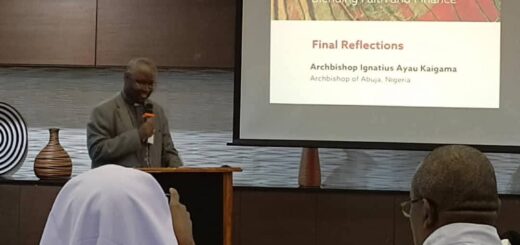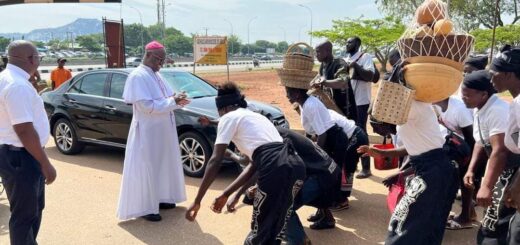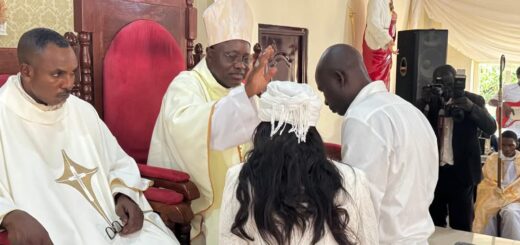Reflection on Hospitality
by ARCH BISHOP · June 28, 2020
Homily by Archbishop I. A. Kaigama. 13th Sunday, 28 June 2020 at St. Luke’s Parish Church, Kubwa, Abuja. Text: 2 Kgs 4:8-11, 14-16a; Rom 6:3-4, 8-11; Mt 10:37-42
Last week in my homily I spoke about the existence of sin and its negative impact on humanity and especially on our contemporary society. I should be dwelling today on the theme of the cross since we read from Matthew’s Gospel 10:38 that Jesus says, “Anyone who does not take his cross and follow in my footsteps is not worthy of me.”
I have however chosen to reflect on the theme of hospitality, believing that even if we have a big cross to carry and we are there for one another, hospitable to one another, we shall carry the cross successfully and fruitfully. The first reading tells us about a couple who found favour with God through their hospitality to Elisha the prophet of God. Little did they know that their hospitality was going to attract the unexpected blessing of a child. Note that their charity towards Elisha was not in anticipation for a reward. They were simply being hospitable to the man of God.
Abraham’s hospitality to “three men” who were passing through his neighbourhood became the key that opened the womb of his wife and she gave birth to Isaac even when she had grown pass the age of child birth (cf. Genesis 18:1ff).
Jesus in today’s Gospel alludes to the hospitality which when given to the disciples or prophet or holy man or the little ones, draws immense reward. If we have the spirit to graciously welcome and support one another and equitably distribute our God-given resources, our burdens as Nigerians will become much lighter and the violence we witness which is really a protest of the materially deprived manifesting in different forms will be greatly minimized.
Hospitality means that you welcome others with love and dignity, because they are made in the image and likeness of God. It means that if you are a Hausa man from Kano, you can welcome and integrate whole-heartedly, with respect and genuine love somebody from Enugu or Ibadan or Calabar. And if you are an Igbo person from Enugu, you do the same to someone from Sokoto, Katsina, Makurdi or Zaria.
A Nigerian should be able to live and work in a hospitable and safe environment in the North or South or East or West of Nigeria without suffering discrimination. Unfortunately, because of the “indigene” syndrome, neighbours sometimes fight dirty. Nigerians identify their States in terms of tribe, and we know that tribes in Nigeria see other tribes as opposition or competitors and so, parochial ethnic interests always prevail rather than the common good. The twin problems of ethnic chauvinism and religious myopia added to poverty because of economic injustice are responsible for the conflicts, killings, destruction of farms, animals and even physical infrastructure. Surprisingly, even very educated, enlightened and well exposed Nigerians fail the test when it comes to issues of religion and tribe. The philosophy is: “We first and others after”. Sadly, this is a tragic recipe for disaster and continuous acrimony.
People (including religious leaders) easily become sentimental and almost confrontational or stand truth on the head when issues that affect their ethnic group are up for discussion. The Jukun and Tiv in Taraba State where I come from have been needlessly at each other for decades; inflicting deadly blows, exterminating innocent lives and creating harsh economic hardship for the already poor populations. Why can’t the Tiv and Jukun in the name of God stop the mutual brutality, the stereotyping; the jaundiced perception of one another and give one another the right hand of fellowship and do what they are best known for, farming and fishing, so that they can experience economic prosperity and a healthy interpersonal relationship, since most of them claim to be Christians?
I pray it would be possible that senior Jukun politicians, priests or traditional rulers sincerely look straight into the eyes of Tiv people and say, “these are our brothers and sisters, made in the image and likeness of God, we will do no harm to them”. And I pray also that Tiv stakeholders look lovingly the Jukun people in the eye and say, “we love and respect you with God’s love because you are our brothers and sisters”. Unfortunately, each group is at pains to prove that they are the victims, not the aggressors; yet one sees burnt Jukun and Tiv villages or Tiv and Jukun people killed and wonder if aliens from space are responsible. To stop these killings because of fertile agricultural land over which the Jukun and Tiv may be fighting, the Government should site agricultural projects in the affected areas and equip the youth with modern farming tools that will keep them busy. This will foster economic progress, social integration and peaceful coexistence.
Millions of Nigerians are heartily welcome in other countries but at home we choose to tag one another as “foreigners’. A man of Kenyan roots rose to be the President of the US. It can and should happen in Nigeria whereby Nigerians of southern, northern, eastern or western origin will be treated well and not given second class treatment because they are “different”.
Dear brothers and sisters, we already have enough problems from COVID-19, religious fanatics, militant herdsmen, bandits, etc. We should learn to cultivate the kind of peaceful environment that prophet Isaiah describes in 11:6; such a hospitable climate that “The wolf will dwell with the lamb; and the leopard will lie down with the kid; the calf and the lion and the sheep will abide together; and a little boy will drive them.




